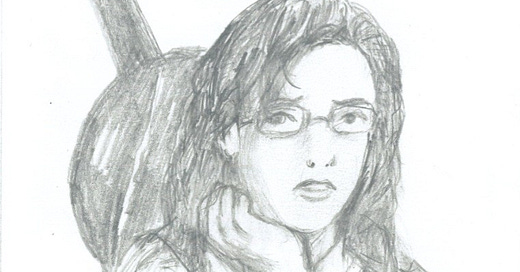Memoirs of a Shattered Soul — 10: A Broken Violin
The violin dropped to the floor with a crash, and I could see that it was broken, cracked.
June 8, 2013
I have had various different violins in my life. The first one I ever played on when I was five years old was so small that it almost seemed like a toy. Then when I was seven, I was given a larger one. The same thing happened when I was ten. Finally, when I was thirteen, my mother gave me the violin that I brought with me from Japan to Switzerland five months ago. It’s a 4/4 or full-size violin, an instrument that I could use even as an adult. I’ve grown used to hearing its “voice” in my ear every day. I thought that it would serve me for many years to come.
It turns out I was wrong, though.
Marilyn and I have been faithfully visiting Mr. Hauser in Interlaken twice a month since April. I’ve come to appreciate that he is a very special man and feel happy to have him as a friend— although admittedly, the friendship has often seemed rather one-sided. Because of the disease ailing his mind, he never recognises me when I visit. Marilyn has to present me again each time as if it were our first meeting: “Hello, Abelard. This is Yukiko.” Although I was starting to think that maybe, finally, he was somehow beginning to get used to my visits in spite of not remembering me, if that even makes any sense.
What he does remember, absolutely flawlessly, is music. As Marilyn told me before our first visit, it “brings back a little of who he was before.” Not only does he know every classical song I play, it seems as though he has a story about each one. He told me that musical scholars believe the minuets I learned in my first Suzuki violin book are not actually written by Bach, although Bach included them in a notebook of simple harpsichord music for his lively young wife Anna Magdalena. He told me that when Vivaldi composed “The Four Seasons,” he also wrote a corresponding sonnet for each section, describing what sounds in nature the music was depicting: for example, a fire crackling in a frozen landscape for “Winter” or a dog barking at a sleeping goatherd in “Spring.”
A few times he shared stories about famous violinists. Some are historical anecdotes, like the one about young Wolfgang Amadeus Mozart touring Europe with his father and his harpsichord playing sister Nannerl, or another about Niccolò Paganini receiving a knighthood from the Pope but then being accused by others of selling his soul to the devil. Some are more personal tales about violinists he has actually met or worked with in his lifetime. He has even told me stories about famous violins, like some of the ones created by Antonio Stradivari.
The most wonderful moment for me every time we visit Mr. Hauser is at the end, when he asks me with a childlike artlessness, “Can I play your violin?”
Each time when I agree, he takes the instrument from my hands as reverently as if it were a Stradivarius, and lifts the bow to begin to play. The sound that fills that little room in Interlaken is extraordinary, as if I were in a concert hall and one of those legendary violinists he likes talking about had invited me onstage and was playing just for me.
Today it happened again. He took my violin, closed his eyes and played the Adagio from Bach’s Sonata No. 1 for solo violin. It was spellbinding. I have never in my life played this piece, although I’ve heard it before. Also, I never think of Bach as being melancholy, but there is so much anguish in every note of this piece. In those five minutes of listening to the violin’s haunting sounds, I felt as though it were telling the story of everything I had been feeling in the months since my mother fell into a coma.
I thought, How is it possible that this music can see right into my soul?
When he finished playing, Marilyn and I applauded. Then he bent over as if he was giving a bow— that’s what I thought, at least— but then he was clutching his chest and suddenly he was grimacing in pain. The violin dropped to the floor with a crash, and I could see that it was broken, cracked.
Then, even worse, Mr. Hauser fell down too, like a broken doll. Marilyn was ringing a bell to call a nurse. It seemed like an eternity before the nurse arrived and after that… I don’t remember anything else. It’s as if I have Alzheimer’s myself. The next few hours are an almost total blank.
Marilyn told me that it was a heart attack. Mr. Hauser is in the hospital now, his life hanging by a thread.
I have a vague memory of crying on our train ride back to Lauterbrunnen, clutching my violin case with the broken violin inside. Then I remember arriving at our house and Marilyn telling my father what had happened.
There’s one detail which keeps coming back to my mind over and over again, like a video stuck in a loop: a moment, just after he dropped my violin, in which Mr. Hauser stretched out his hand toward me and I could see the number tattooed onto his arm above the wrist, a souvenir from Auschwitz seventy years ago.
He escaped the Angel of Death back then, but as my father has told me, no one lives forever.
Still, something inside me keeps whispering like a prayer: Please, don’t let him die… Please, please, don’t let him die.




